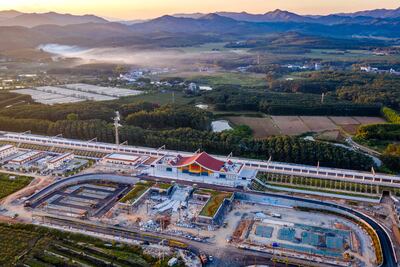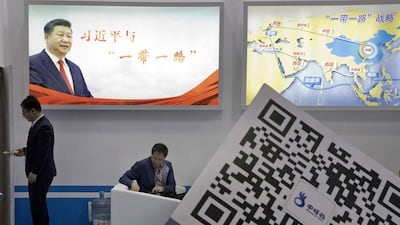When Italy joined China’s Belt and Road Initiative in 2019, it was a big deal. A majority of the world – 148 states – may have signed up to the ambitious global investment programme at the time, but Italy was the only member of the G7 to do so. Despite northern European stereotypes about it being a country of style and siestas, it is globally the eighth-largest economy. Italy being in the BRI gave weight to the idea that the ancient Silk Roads could be revived throughout the breadth of the Eurasian landmass.
But now the country’s defence minister, Guido Crosetto, has not only suggested that the agreement should not be renewed automatically next March. He has said that the decision to join in the first place was an “improvised and wicked act”. This is very strange and emotional language to use about a loose association that aims to boost trade and build much-needed infrastructure. It is also inconsistent with Mr Crosetto’s aim of walking back from the BRI “without damaging relations” with Beijing, as he put it in an interview with the Italian newspaper Corriere della Sera.
But his words are not backed by the facts in any case. “We exported a load of oranges to China, they tripled exports to Italy in three years,” complained Mr Crosetto. But Politico reports that: “Chinese exports to Italy increased 51 per cent from 2019 to 2022, while China's imports from the EU country rose by 26 per cent during the same years, according to Italy’s Trade Agency.” That’s either an awful lot of oranges, or it’s way more substantial than that.

What is true is that Chinese foreign direct investment in Italy has been very low over the past few years. So if the Italian government wanted to leave the BRI, it could have done so diplomatically by citing those figures and saying that the partnership hadn’t really worked out, but had been a worthwhile effort.
Instead, Mr Crosetto has used words that appear calculated to offend, playing straight into the narrative that the BRI is either some kind of con trick or a cunning ploy by which other countries will unwittingly end up under Beijing’s influence. It is no surprise that several reports about his explosive intervention all refer to China’s “controversial” BRI, as though the adjective naturally attaches itself to the initiative.
That is not a view, however, that is supported by any objective study of the BRI. The European Bank for Reconstruction and Development, for instance, describes it more soberly and sensibly: “China’s Belt and Road Initiative is a strategy initiated by the People’s Republic of China that seeks to connect Asia with Africa and Europe via land and maritime networks with the aim of improving regional integration, increasing trade and stimulating economic growth. The BRI has been associated with a very large programme of investments in infrastructure development for ports, roads, railways and airports, as well as power plants and telecommunications networks … The BRI now places increasing emphasis on ‘high quality investment’, including through greater use of project finance, risk mitigation tools, and green finance.”
As someone who represented Malaysia at a conference on the BRI in Bangladesh, in the heart of a region – South and South-East Asia – that has direct knowledge of the BRI’s effects, I say: that’s more like it.
One of my fellow speakers, Dr Zhang Jiadong of China’s Fudan University, put it aptly. The BRI is not a new form of Chinese colonisation, he said, neither is it a strategy. “It is a process” whose focus had shifted “from economic development to constructing a community of ‘shared destiny for all mankind’”.

A 2020 report published by Chatham House, titled Debunking the Myth of “Debt-trap Diplomacy”, defused one of the main charges against the BRI, with the authors concluding that “developing country governments are not hapless victims of a predatory Beijing. They – and their associated political and economic interests – determine the nature of BRI projects on their territory”.
That includes negotiating with Chinese state-owned firms to ensure that local populations make up a satisfactory proportion of the workforce on projects, and undertaking analyses into affordability, sustainability and long-term returns on investment. Just being responsible, in other words.
Italy’s Mr Crosetto either has such a low opinion of his colleagues that he thinks they are not capable of behaving in such a manner if his country remains in the BRI, or he simply wants to have as little as possible to do with China or Chinese firms. Either way, if his aim was truly not to damage relations with Beijing, he would appear to have failed by speaking so discourteously.
Thus far, the reaction has been mild. An editorial on viewing the BRI as a “trojan horse” in the Chinese Communist Party’s Global Times stated: “We do not want to see a closed and conservative Europe, and China has no intention to change Europe … The intermingling and interaction of different civilisations is the path to joint development in the new era.”
If Italy, and Europe as a whole, cannot see the BRI as “a pathway through which we can collaborate and enhance mutual understanding”, as Global Times puts it, but instead insists on demonising it in the crudest terms on the basis of cherry-picked facts and unsubstantiated smears, a huge opportunity will have been lost. And as a European living in Asia, it dismays me to see such unwarranted hostility to what could be the 21st century’s greatest trading initiative – all because it is led by China.


